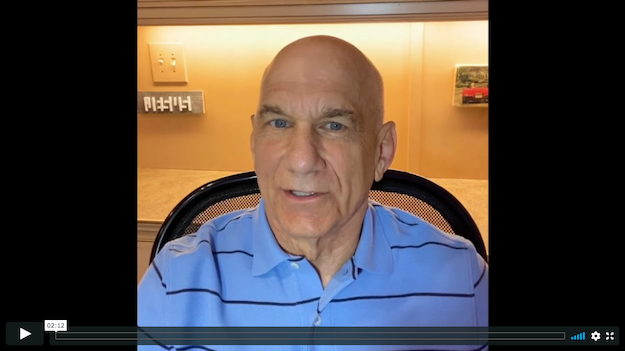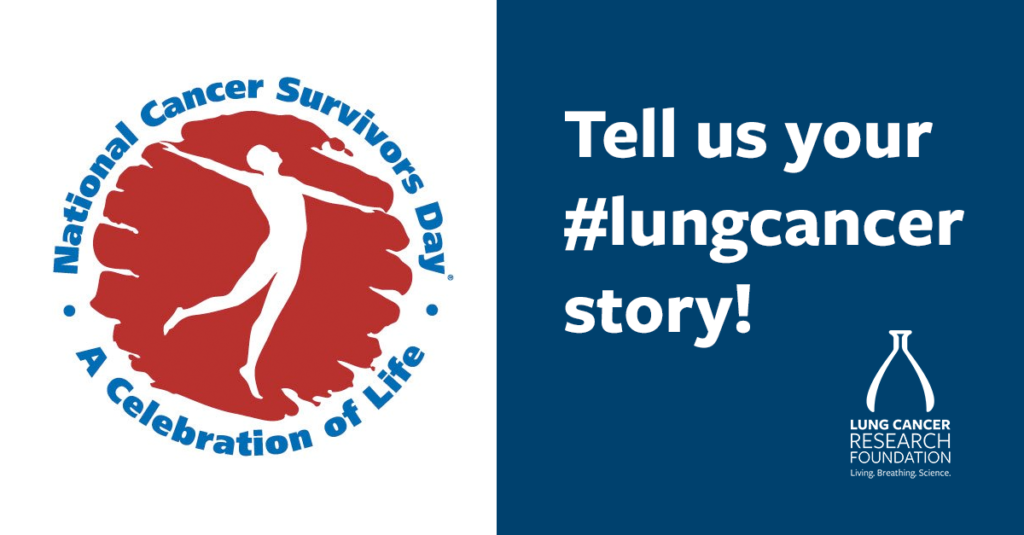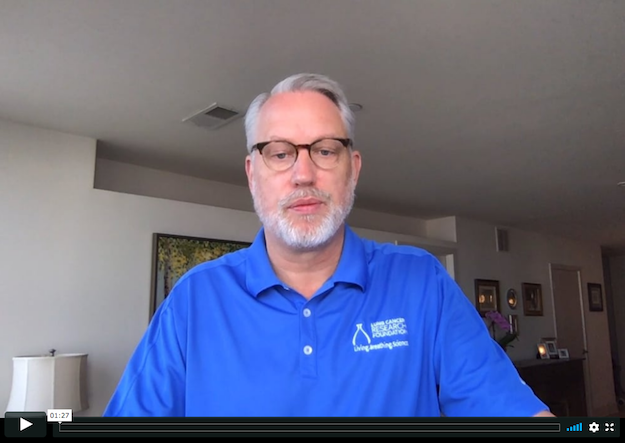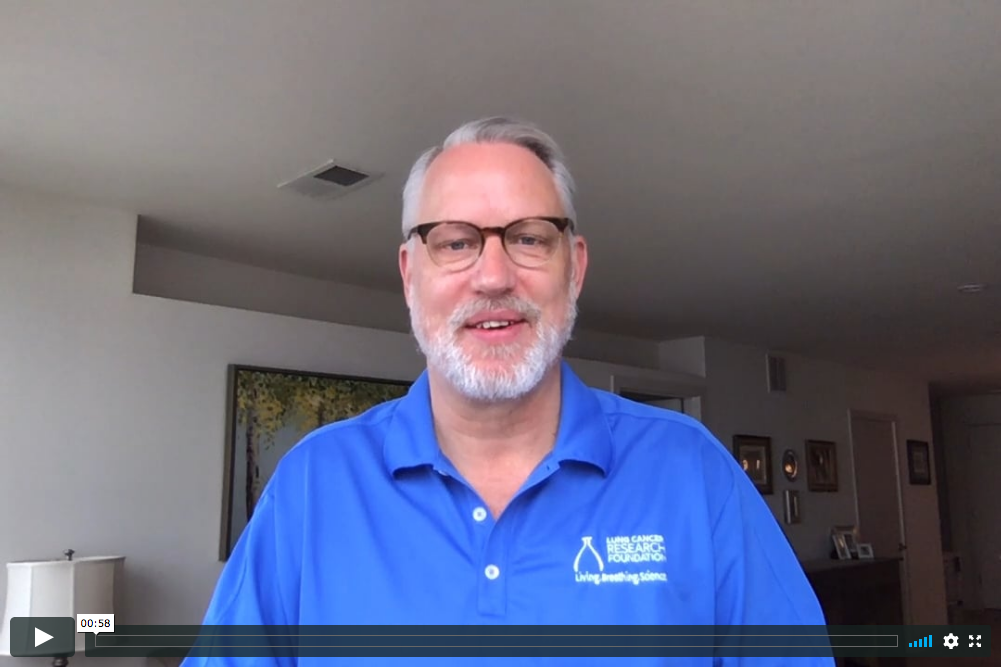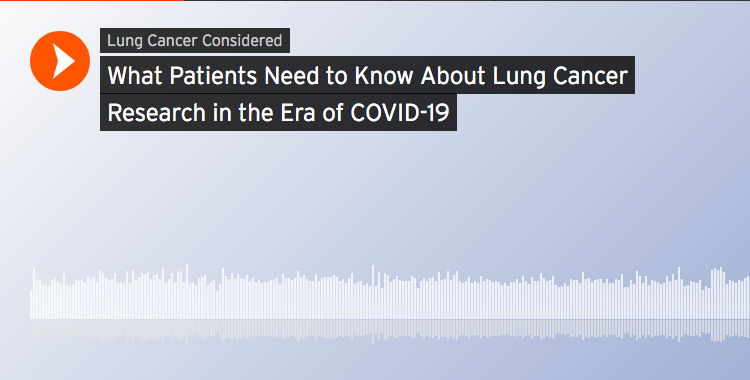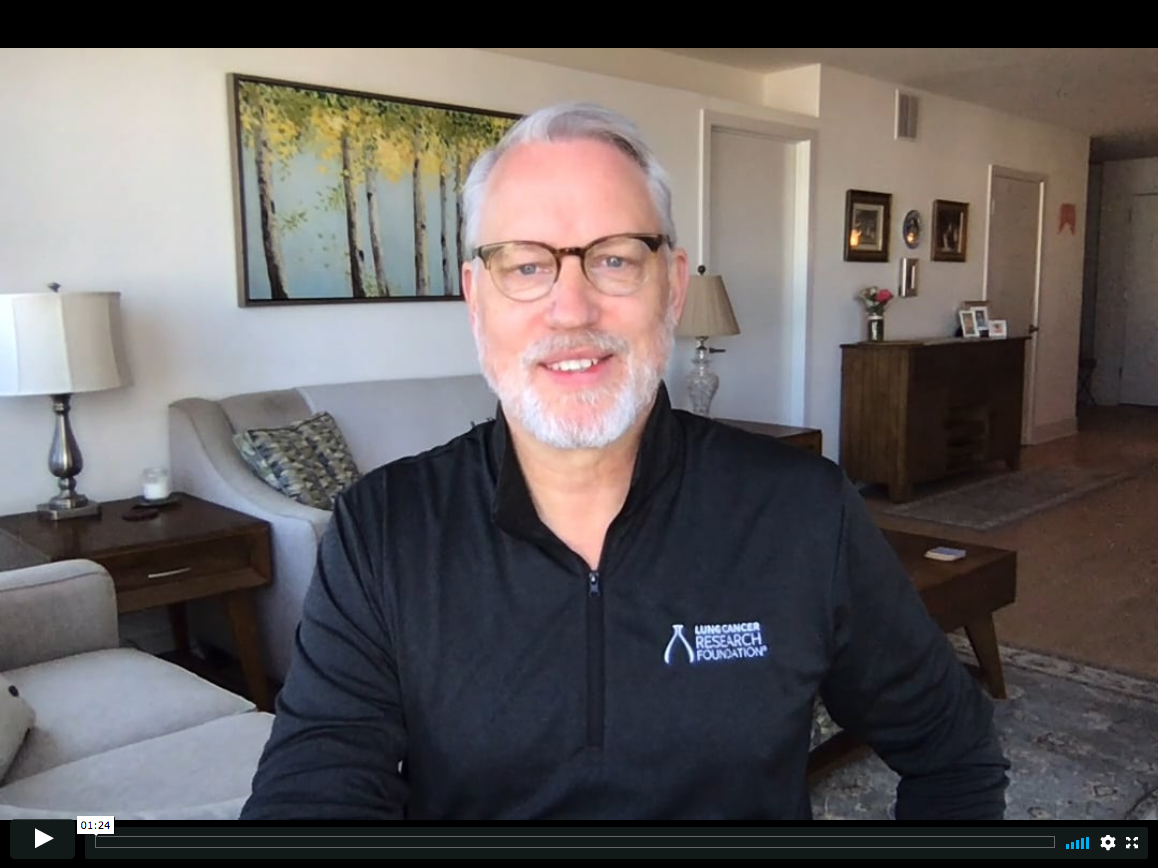Dr. Alexander Drilon joined our #TogetherSeparately Live Talk on Thursday, junio 11, followed by yoga with Risë Van Doosselaere. Watch the recording below:
News
CURE® and LCRF partnered to bring top experts together for an informative webinar focused on topics that were highly relevant to lung cancer patients, caregivers, and research advocates. Watch the full one-hour webinar below.
Panel faculty:
Leora Horn MD, MSc
Associate Professor & Clinical Director, Thoracic Oncology Program at Vanderbilt University Medical Cancer.
Jyoti D. Patel, MD
Professor of Medicine at Northwestern University.
Ali Schaffer, LCSW
Private Counseling Practice
LCRF Patient Educational Programs Review Committee
The 2020 American Society of Clinical Oncology (ASCO) Annual Scientific Program went virtual for the very first time in an unprecedented year for both the world and for lung cancer research. A timely six new FDA approvals came out right before ASCO, paving the way for a rich discussion and reasons to look forward to future progress. Below are some of the major highlights from ASCO 2020 and what the future holds for lung cancer research.
Non-small cell lung cancer
The much anticipated abstract and discussion of the ADAURA trial was presented by LCRF Scientific Advisory Board (SAB) member Dr. Roy S. Herbst and his colleagues. The ADAURA trial was a phase III trial looking at the efficacy of osimertinib (Tagrisso) as an adjuvant targeted treatment for early stage NSCLC patients with the EGFR mutation with or without standard chemotherapy treatment. The trial ended the double-blinded study design earlier than expected due to evidence that Osimertinib provides a 79% reduction in risk of disease or recurrence of disease. This trial is the first evidence in research showing a benefit to adding targeted therapy to the existing standard of care for this particular lung cancer patient group.
The GEOMETRY mono-1 trial presented at ASCO highlighted the ground-breaking work that went behind last month’s FDA approval of capmatinib (Tabrecta). Capmatinib is currently approved to treat NSCLC patients with the MET exon 14 mutation. The trial showed evidence that capmatinib can be used in both previously treated and treatment naïve patient groups with favorable safety profiles. Capmatinib is the first ever targeted therapy approved to treat the MET exon 14 mutation.
The LIBRETTO-001 trial presented another brand new targeted therapy for the RET mutation recently FDA approved. Selpercatinib (LOXO-292) used to treat NSCLC patients with the RET mutation showed significant disease improvement and tolerability, regardless of prior treatment. Two more targeted therapies are being studied and up for possible FDA approval to treat the RET mutation as well. An abstract by LCRF grantee Dr. Alexander Drilon and colleagues on the ARROW trial show promising evidence for TPX-0046 for a RET treatment. Out of the same ARROW trial, pralsetinib (BLU-667) was presented on, which showed successful treatment results for solid tumors containing the RET mutation.
There is much left to discover in the treatment space for lung cancer patients who do not respond well to immunotherapy or targeted therapy. An abstract presented at ASCO by LCRF grantee Dr. Diane Tseng and colleagues explored pathways to enhancing the immune system’s response to cancer cells. This work paves the way for better understanding how T cells can be mapped for use in lung cancer treatment.
Efforts continue to identify targeted treatment for NSCLC patients with the KRAS mutation, which occurs in upwards of 30% of all NSCLC patients. An abstract presented by LCRF grantees Dr. Kathryn Arbour, Dr. Mark Kris, Dr. Charles Rudin, and their colleagues shows promising results of an early phase clinical trial examining the use of a KRAS-G12C mutation (occurs in 12% of NSCLC patients) therapy. This is currently being compared to chemotherapy and immunotherapy to identify efficacy for this significantly large NSCLC patient group.
Small cell lung cancer
In 2018 the first ever immunotherapy treatment (nivolumab) was approved by the FDA for SCLC, a rare and aggressive type of lung cancer that hasn’t seen a new treatment approval in over a decade. Since then, researchers have been working diligently to examine adjuvant treatments for SCLC.
At ASCO 2020, LCRF SAB member Dr. Suresh Ramalingam and colleagues presented their abstract on the use of nivolumab (Opdivo) in combination with chemotherapy for the first-line treatment of extensive-stage SCLC. Their study showed that the addition of nivolumab provided a significant benefit without any additional safety issues. Nivolumab was originally FDA approved only as a third-line treatment for SCLC.
Proving similar, the KEYNOTE-604 trial was presented by LCRF SAB member Dr. Charles Rudin and his colleagues, on the addition of pembrolizumab (Keytruda) to chemotherapy treatment as a first-line treatment for extensive-stage SCLC. The combined use of pembrolizumab plus chemotherapy showed prolonged overall survival versus chemotherapy alone.
Looking ahead to the future of lung cancer research
ASCO 2020 highlighted the blossoming diversification of lung cancer treatment options. As we begin to understand more about biomarkers (mutations) we will continue to see progress on the identification of personalized treatments. Historically, lung cancer was seen as a homogenous group with no differentiation between patient groups within. The advent of personalized medicine has completely changed the way we think about lung cancer. More than ever we are identifying the unique patient groups within the lung cancer space. Research exploring the adjuvant treatment setting will continue to thrive and identify the safest and most effective combinations of treatment.
ASCO abstract sources:
- Abstract #3087 Diane Tseng, Stanford – Discovery of a novel shared tumor antigen in human lung cancer
- Abstract Dr. Roy Herbst – Osimertinib as adjuvant therapy in patients (pts) with stage IB–IIIA EGFR mutation positive (EGFRm) NSCLC after complete tumor resection: ADAURA
- Abstract – FDA approved selpercatinib for RET
- Abstract – ARROW RET mutation pralsetinib tx trial ongoing
- Abstract Dr. Suresh Ramalingam – nivolumab for 1st line ES-SCLC
- Abstract Dr. Charles Rudin – pembro + chemo for 1st line ES-SCLC
- Abstract – GEOMETRY trial with capmatinib for NSCLC MET
- Abstract Dr. Alex Drilon – RET new drug TPX0046
- Abstract Dr. Kathryn Arbour, Dr. Mark Kris, Dr. Charles Rudin – KRAS G12C mutation therapy abstract
junio 7, 2020 is National Cancer Survivors Day, and LCRF is grateful to survivors like John Doll, who shared his experience as a lung cancer patient. John, as a patent examiner and commissioner for patents in the U.S. Patent & Trademark Office, was intimately aware of drugs developed specifically for cancer treatment. Hear directly from John about the importance of research for drug design and development in treating lung cancer and why he supports the work of LCRF.
Share your #lungcancer story – email info@lcrf.org.
Watch this week’s update from LCRF Executive Director Dennis Chillemi.
Join us #TogetherSeparately™
- Register for virtual Free to Breathe Yoga, taking place Saturday, junio 20.
- Get our latest information on lung cancer and coronavirus at LCRF.org/COVID19.
- Keep the dialog going in the Lung Cancer Community Facebook group.
LCRF is proud to partner with CURE® to host an upcoming Educated Patient® Lung Cancer Webinar on Thursday, junio 4 at 8 PM ET / 7 PM CT. Ali Schaffer, LCSW from LCRF’s Patient Educational Programs Review Committee will be part of the panel sharing tips for mental health during COVID-19. Other presenting faculty include Leora Horn, MD, MSc, PRCPC and Jyoti D. Patel, MD.
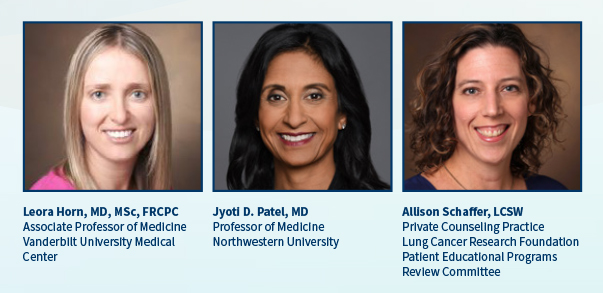
The webinar will cover topics highly relevant to patients, caregivers and advocates right now. Participants will have the opportunity to submit questions to be answered live by our expert panel. On this webinar you’ll also hear from the experts on topics such as:
- Current trends with lung cancer diagnoses
- Biomarker testing
- The use of telemedicine
- Treatment options
- Mental health and wellness
“Those who are doing well and are stable in terms of safety and tolerability can come into the office less often,” Dr. David R. Spigel, said. “(This is) a big win.”
By Ryan McDonald | Published may 21, 2020 in CureToday® | Reprinted with permission
The Food and Drug Administration’s recent approval of a higher recommended dose of Keytruda (pembrolizumab) every six weeks for adults across all cancer types in which the drug is indicated is a welcomed change for patients, according to experts.
“(Keytruda) is one of those medications that wedge being on an IV infusion every three weeks (and) is something that from a patient standpoint can be very cumbersome,” Dr. Chung-Han Lee, a medical oncologist at Memorial Sloan Kettering Cancer Center, said in an interview with CURE®.
The accelerated approval was based on data about the way the body processes the drug, and the relationship between exposure to the therapy and both efficacy and safety.
The new approved dose is 400 milligrams (mg) and can be administered every six weeks in patients who take Keytruda alone, or in combination with other medications. However, the current dose of 200 mg administered every three weeks is still available.
Saving Patients Time
Lee, who is a member of the Kidney Cancer Association’s Medical Steering Committee, noted that patients with kidney cancer who receive the combination of Inlyta (axitinib) and Keytruda can continue on therapy for two years, meaning they could have come into the office for treatment at least 35 times during that time.
“Being able to reduce that is, especially for people who are having a good response and not significant toxicities related to their treatment, very beneficial,” he said.
Additionally, Lee said, the extended dose would be beneficial and reduce the number of trips to the clinic for patients who are receiving single-agent Keytruda for bladder cancer and are presenting with very limited side effects.
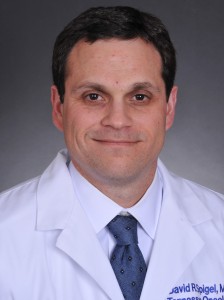
The prospect of fewer trips is always a win for patients and families, according to Dr. David R. Spigel, chief scientific officer and director of the Lung Cancer Research Program at Sarah Cannon Research Institute.
“(This approval is) great for patients,” Spigel, a member of the Lung Cancer Research Foundation’s Scientific Advisory Board, said in an interview with CURE®. “Those who are doing well and are stable in terms of safety and tolerability can come into the office less often. (This is) a big win.”
Approved During COVID-19
Although the approval of the extended dose helps support social distancing recommendations during the COVID-19 pandemic, the new approved dose will likely still have a place in treating patients across all indicated cancer types.
Lee acknowledged that part of the thought process behind the approval likely had a connection to risks related to a COVID infection, but that time will allow for more safety data ro see how the extended dosing interacts with any other treatments given in combination with Keytruda.
“This is something we’re going to have to look at very closely, but as long as, from a safety perspective, there’s no additional toxicity with the extended dosing and from the efficacy perspective they seem to be the same, then I really do think that there will probably be a lot of adoption even after the social distancing orders are lifted,” Lee said.
Both Lee and Spigel said they don’t see many concerns with implementing this extended dose into care. Spigel noted that the primary impediment has been getting approval from insurance companies to make the transition.
For Lee, he said he doesn’t have any upfront concerns regarding the extended dosing but did note that patients just beginning treatment should be closely monitored to ensure they don’t develop autoimmune side effects.
“For people who are already on pembrolizumab, and we know that they have had few side effects related to it, then I would think about using it as of right now,” Lee explained. “It is something that is a welcome change and certainly with any sort of change, we want to watch closely and make sure that the changes are appropriate.”
Keep Communication Open
Spigel mentioned that it is important for patients who are receiving the new dose to maintain communication channels with their oncologists to express any concerns they may have.
“Cancer-related symptoms or safety issues can occur at any time and seeing a patient less often creates a longer window for those assessments,” he said. “Adapting to a six-week schedule should be a good thing for most patients, but there will be some who need to be seen more often. “It’s important to continue to be vigilant to ensure safety and benefit from treatment.”
Watch this week’s update from LCRF Executive Director Dennis Chillemi.
Join us #TogetherSeparately™
- Thank you to everyone who shared a story about a loved one this week.
- Join the Free to Breathe Yoga Kickoff livestream on Wednesday, junio 3. Then register for virtual Free to Breathe Yoga, taking place Saturday, junio 20!
- Get our latest information on lung cancer and coronavirus at LCRF.org/COVID19.
- Keep the dialog going in the Lung Cancer Community Facebook group.
The may 26, 2020 episode of Lung Cancer Considered features a collaborative dialogue between leading patient research advocates, advocacy organizations including LCRF, and lung cancer researchers and clinicians. Topical and timely, the episode addresses the critical information that lung cancer patients need to know in the COVID-19 era, acting as a testament to the global lung cancer community’s commitment to support, solidarity and information-sharing in this difficult time.
Lung Cancer Considered is the official bi-monthly podcast of the International Association for the Study of Lung Cancer (IASLC).
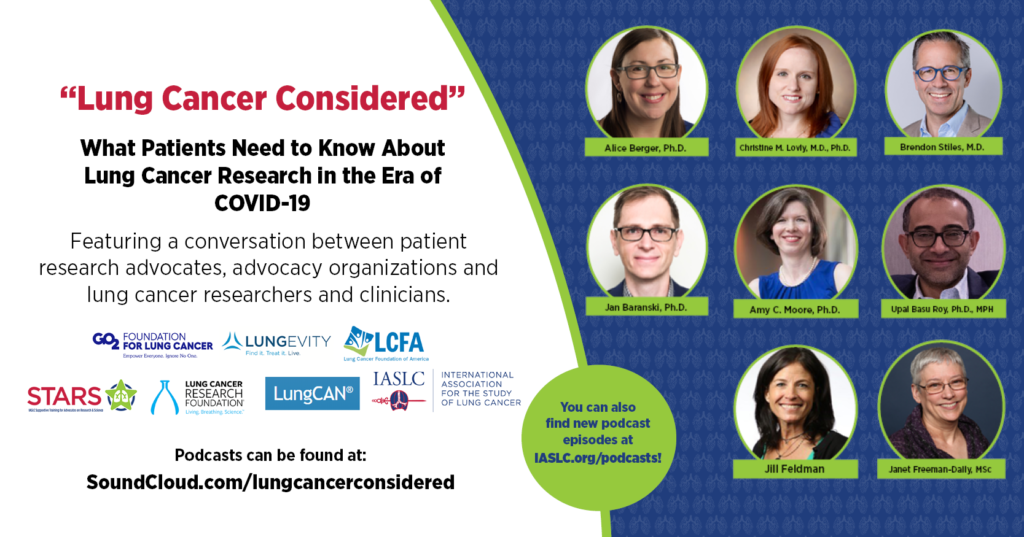
Featured in this episode:
- Janet Freeman-Daily, writer, lung cancer patient, advocate and Twitter chat moderator, Lung Cancer Social Media chat (#LCSMchat)
- Jill Feldman, lung cancer advocate and patient
- Dr. Alice Berger, Assistant Professor of Human Biology, Fred Hutchinson Cancer Research Center; LCRF grantee; member of LCRF Scientific Advisory Board
- Dr. Christine Lovly, Associate Professor of Medicine, Division of Hematology and Oncology; Ingram Associate Professor of Cancer Research, Vanderbilt University Medical Center; ; member of LCRF Scientific Advisory Board
- Dr. Brendon Stiles, Associate Professor of Cardiothoracic Surgery, Weill Cornell Medical College, Cornell University; Associate Attending Cardiothoracic Surgeon, New York Presbyterian Hospital; LCRF Board Chair; LCRF Scientific Advisory Board Vice Chair
- Dr. Jan Baranski, Vice President of Scientific and Patient Programs, LCRF
- Dr. Amy Moore, Director of Science and Research, GO2 Foundation for Lung Cancer
- Dr. Upal Basu Roy, Vice President of Research, LUNGevity Foundation
Listen to the episode in the player below, or subscribe at soundcloud.com/lungcancerconsidered.
Watch this week’s update from LCRF Executive Director Dennis Chillemi.
Join us #TogetherSeparately™
- Share your stories about those we’ve lost to lung cancer. We will feature them next week, starting Monday, may 25.
- Join the Free to Breathe Yoga Kickoff livestream on Wednesday, junio 3. Then register for virtual Free to Breathe Yoga, taking place Saturday, junio 20!
- Read about the recent FDA announcements, and support lung cancer research that leads to new treatments.
- Get our latest information on lung cancer and coronavirus at LCRF.org/COVID19.
- Keep the dialog going in the Lung Cancer Community Facebook group.


